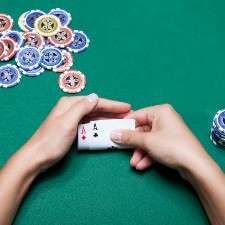Losing streak: Competitive high-school sports linked to gambling

The soft signs of compulsive gambling—high energy levels, unreasonable expectations, extreme competitiveness, distorted optimism and above-average IQs—are often the very traits that characterize competing athletes. However, precious little research is available on the prevalence of gambling among athletes and the relevant warning signs.
A new Tel Aviv University study published in The American Journal of Addictions indicates that high-schoolers involved in competitive sports are at an elevated risk of gambling. According to the research, led by Dr. Belle Gavriel-Fried of TAU's School of Social Work and conducted by TAU student Idit Sherpsky, in collaboration with Dr. Israel Bronstein of Bar-Ilan University, the participation of male high-school students in competitive sports is associated with problem gambling and gambling frequency, and female students who participate in competitive sports are at a higher risk of gambling frequency.
"The drive to win underpins both gambling behaviour and competitive sport," said Dr. Gavriel-Fried. "Most of the research within this area has been conducted on university athletes, but we wanted to dig deeper, find out whether the link between gambling and physical activities began earlier—before other co-factors emerge—and we found out that, in fact, it does."
For the study, the researchers asked 316 high-schoolers, aged 14-19, from four high schools in Israel to fill out questionnaires to establish their involvement in sports and their gambling habits. "Intensive exercise" was assessed on a frequency rating scale. "Competitiveness" was rated by the number of competitive sports engaged in over the previous year, including varsity or junior varsity sports and other extracurricular programs.
Winning vs. fitness
They found a significant difference between youths involved in intense cardiovascular activity (for the sake of exercise alone) and those participating in competitive sports. The latter were more often engaged in regulated lotteries and scratch cards, gambling on other sporting events, poker and other card games.
"Studies conducted on college-age athletes in relation to gambling might be misleading, because the university environment itself has been found to promote risk behaviour," said Dr. Gavriel-Fried. "Here we made a distinction between youths involved in competitive sport and those involved in intensive exercise. The objective of competitive sports is to win as a team, whereas the objective of intensive exercise is to maintain your health and fitness.
"There was a clear divide between the two groups. We hope that this study will redirect high schools to integrate gambling prevention programs for youths involved in competitive sports - in order to avoid sticking 'healthy heads in sick beds,' so to speak."
According to the researchers, due to their competitiveness, athletes as young as 14 should pay closer attention to the risks involved in "harmless" gambling practices, such as card games.
"For competitive athletes, there is an intrinsic impulse embedded within—to win, at all costs. This underpins gambling behavior as well," said Dr. Gavriel-Fried, who is currently researching high-risk behavior and addictions.

















